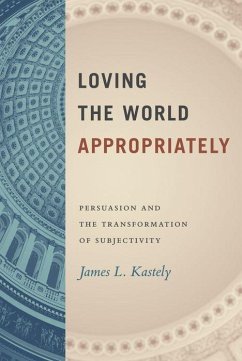"What is persuasion? For some, it should be thought of primarily as an alternative to violence. For others, persuasion is less an ethical practice and more a neutral instrumentality-a valued source of soft power. Whichever position seems more appealing, they both rest on a fundamental belief: persuasion is a power residing in an individual speaker who acts on an audience. But what if we question this basic understanding of persuasion? What if we shift the focus and ask a different-and in some ways more fundamental-question: why does an audience stand in need of persuasion? This is the question that animates Loving the World Appropriately. In turning the question around, James Kastely delivers an original and provocative contribution to the history of rhetoric and philosophy, one that moves persuasion away from being a matter of effective communication and recasts it as an important philosophical concern tied up with fundamental notions of human subjectivity. Ultimately, Kastely insists, the purpose of persuasion is to enable us to love the world appropriately"--
Hinweis: Dieser Artikel kann nur an eine deutsche Lieferadresse ausgeliefert werden.
Hinweis: Dieser Artikel kann nur an eine deutsche Lieferadresse ausgeliefert werden.








